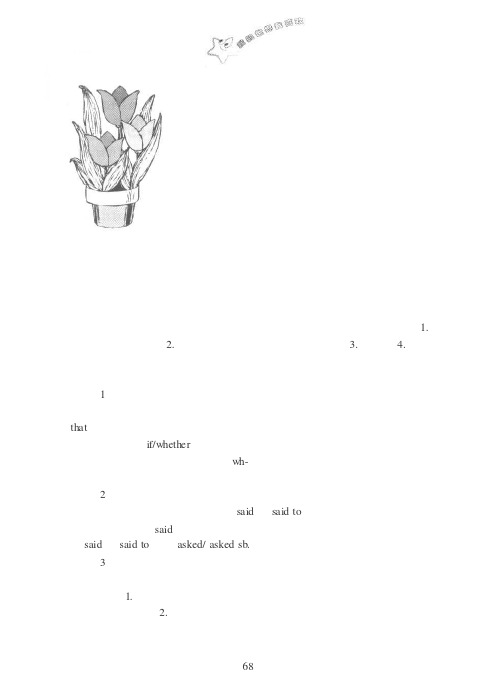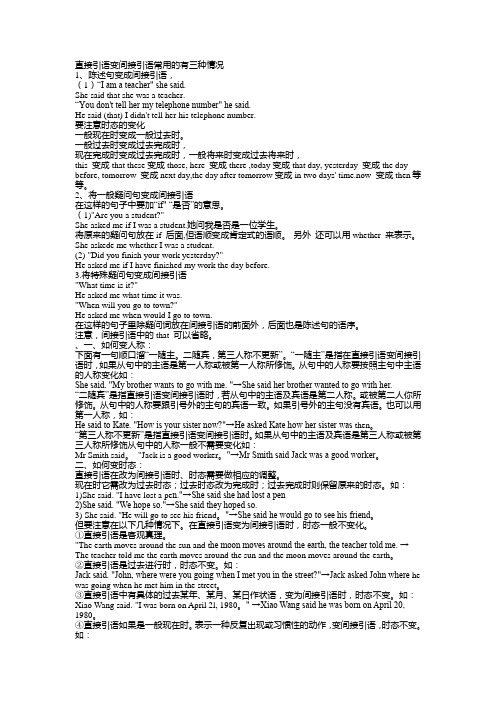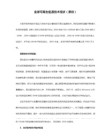直接引语变为间接引语时的“变”与“不变”
- 格式:doc
- 大小:22.50 KB
- 文档页数:7

语法核心突破直接引语变间接引语:定义:我们转述别人的话时,可以引用别人的原话,被引用的部分称为直接引语;用自己的话转述别人的话叫间接引语。
这两种引语都是宾语从句,但是直接引语放在引号内,不用连词联接;间接引语不用引号,通常用连接词与主句联接一、直接引语变间接引语时句式的变化1.陈述句变为以that 引导的宾语从句例如:He said, “I'm very glad.” →He said that he was very glad.2.一般疑问句变为if(whether)引导的宾语从句。
例如:He said, “Can you come this afternoon,John?”→He asked whether (if) John could come that afternoon.3. 特殊疑问句变为由who, what, when等疑问词引导的宾语从句例如:He said, “Where is Mr.Wang?” →He asked where Mr. Wang was.二、人称的变化【点拨】人称的变化一般遵循“一同主,二随宾,三不变”这一原则,例如:“I went to the Great Wall yesterday,” Li Hua said.→Li Hua said that he had gone to the Great Wall the day before.“I’ll come to help you whenever you need my help,” he answered her.→He answered her that he would come to help her whenever she needed his help.She said to me, “Your pro nunciation is better than his.”→She told me that my pronunciation was better than his.三、.时态变化主句的谓语动词是一般过去时,从句的谓语动词在时态方面要做相应的变化,总的原则是向过去推一个时态时态的变化例句一般现在时→一般过去时She said, “I need a calculator.”→She said that she needed a calculator.现在进行时→过去进行时Jim said, “I’m expecting a long distance call.”→Jim said that he was expecting a long distance call.一般将来时→Nancy said, “I’ll call again later.”过去将来时→Nancy said that she would call again later. 一般过去时→过去完成时He said, “I took it home with me.” →He said that he had taken it home with him. 现在完成时→过去完成时Paul said, “Our team has won the match.” →Paul said that their team had won the match. 过去完成时→过去完成时He said, “I had finished my homework before supper.” →He said that he had finished his homework before supper.四、 指示代词、时间状语、地点状语和动词的变化变化形式 例句 指示代词 this → that She said, “She is coming this week.” →She said that she was coming that week. these → thoseHe said, “These books are mine.” →He said those books were his.时间状语 语now →thenHe said, “It ’s ten o ’clock now.” →He said that it was ten o ’clock then. today → that dayHe said, “I haven ’t seen her today.”→He said that he hadn ’t seen her that day. tonight →that night She said, “I’ll come again tonight.” →She said that she would go again that night. yesterday →the day beforeHe said, “This happened yesterday.” →He said that had happened the day before. three days ago → three days before She said, “I arrived two days ago.” →She said that she had arrived two days before. tomorrow → the next day the following day She said, “He ’ll be back tomorrow.” →She said that he would be back the next day.next week →the next week She said, “I’ll do it next week.” →She said that she would do it the next week.地点状语here→thereShe said, “He came here to see Tom.”→She said that he had gone there to see Tom.动词come/bring→go/takeHe said, “I brought it home with me.”→He said he had taken it home with him.【拓展延伸】直接引语变为间接引语时时态不作改变的情况①主句的谓语动词为现在或将来时态,从句的时态无需变化例如:He says, “I’m tired.”→He says that he is tired.He will say, “The boy was lazy.”→He will tell you that the boy was lazy.②当直接引语是客观真理时,不受时间的限制,因此不需要变化时态。

直接引语和间接引语引述别人的话语一般采用两种方式:一种是直接引用别人的原话把它放在引号内,这叫直接引语(Direct speech),如He said:" It is too late.";另一种是用自己的话转述别人的话,这叫间接引语(Indirect speech)。
间接引语相当于一个宾语从句,如,He said it was too late.1.时态变化1)当主句为现在时态时,直接引语变间接引语,时态不变化;主句时态(引号外句子)是:①.一般现在时。
如:He says, “I have finished my homework.”→He says that he has finished his homework.②.一般将来时。
如:She will say, “I'll do it tomorrow.”→She will say that she'll do it the next day.2)当主句为过去时态时,直接引语变间接引语,时态要发生变化。
①.一般现在时变一般过去时:The girl said, “I'm sorry for being late for class.”→The girl said that she was sorry for being late for class.②.一般过去时变过去完成时:He said to me, “I met your father.”→He told me that he had met my father.③.一般将来时变过去将来时:She said, “He will go to see his friend.”→She said he would go to see his friend.④.现在完成时变过去完成时:She said. “I have lost a pen.”→She said that she had lost a pen⑤.现在进行时变过去进行时:She said to me, “I’m studyin g Japanese these days.”→She told me that she was studying Japanese those days.3)当主句是过去时态时,时态也有不需要变化的情况。


引述或转述别人的话称为“引语”。
直接引用别人的原话,并且用引号标出,叫做直接引语;用自己的语言转述别人的话,不需要引号,这叫做间接引语。
实际上间接引语大都是宾语从句,其中由祈使句转换的间接引语除外(祈使句转化为动词不定式)。
直接引语变成间接引语时,先需要对直接引语部分的句子作分析,来确定连词的选用;其次在转变过程中还需要对句子的结构、人称、时态、时间状语和地点状语等作变化,归纳起来可以浓缩为:1.变引号确定连接词;2.变人称(遵循“一主,二宾,三不变”)3.变时态;4.变时间、地点状语等。
直接引语变间接引语时过程比较复杂,在改写中应具体注意以下几点:(1)连词使用若直接引语引号里的内容是陈述句,那么改为间接引语时,要用连词that (可以省略)。
若直接引语引号里的内容是一般疑问句,那么改为间接引语时,要用连词if/whether (不可以省略)。
若直接引语引号里的内容是特殊问句,那么改为间接引语时,要用wh-(即本身的疑问词)连词来引导(不可省略)。
(2)主句动词的变化一般来说,主句谓语动词常为said 或said to ,变为间接引语时,当直接引语是陈述句时,said 不变。
当直接引语是一般疑问句和特殊问句时,则要把said 或said to 变为asked/asked sb.。
(3)从句人称的变化由直接引语变间接引语时,从句的主语人称要遵循“一主、二宾、三不变”原则。
1.如果直接引语的主语是第一人称,变为间接引语时,要和主句的人称保持一致。
2.如果直接引语的主语是第二人称,变间接引语时,要和■江苏宝应杨开华直接引语转化为间接引语的“变”与“不变”★主句的宾语保持一致。
3.如果直接引语的主语是第三人称,变为间接引语时,人称不变。
如:1.They said ,“We will go there by bus.”→They said (that )they would go there by bus.(直接引语的主语we 是第一人称,应和主句主语人称they 一致,故改为they )2.She said to me ,“Are you interested in English?”→She asked m e if I was interested in English.(直接引语的主语you 是第二人称,变间接引语时应和主句的宾语me 保持一致,故改为I )3.His mother said to me ,“He can ’t go to school.”→His m other told me that he couldn ’t go to school.(直接引语的主语he 是第三人称,变间接引语时人称保持不变,故仍用he)(4)从句动词时态的变化1)如果主句的时态是一般过去时,从句的时态则用相应的过去某种时态(即:过去进行时,一般过去时,过去完成时,过去将来时),具体变化为:一般现在时→一般过去时;一般过去时→过去完成时;现在进行时→过去进行时;现在完成时→过去完成时;过去完成时→过去完成时;一般将来时→过去将来时。

直接引语变间接引语常用的有三种情况1、陈述句变成间接引语,(1)“I am a teacher" she said.She said that she was a teacher.“You don't tell her my telephone number" he said.He said (that) I didn't tell her his telephone number.要注意时态的变化一般现在时变成一般过去时。
一般过去时变成过去完成时,现在完成时变成过去完成时,一般将来时变成过去将来时,this 变成that these变成those, here 变成there ,today变成that day, yesterday 变成the day before, tomorrow 变成next day,the day after tomorrow变成in two days' time.now 变成then 等等。
2、将一般疑问句变成间接引语在这样的句子中要加“if" “是否”的意思。
(1)"Are you a student?"She asked me if I was a student.她问我是否是一位学生。
将原来的疑问句放在if 后面,但语顺变成肯定式的语顺。
另外还可以用whether 来表示。
She askede me whether I was a student.(2) "Did you finish your work yesterday?"He asked me if I have finished my work the day before.3.将特殊疑问句变成间接引语"What time is it?"He asked me what time it was."When will you go to town?"He asked me when would I go to town.在这样的句子里除疑问词放在间接引语的前面外,后面也是陈述句的语序。

直接引语变间接引语的七点变化 ?一、时态的变化直接引语变为间接引语时,若主句为过去时态,变为间接引语的宾语从句通常要将时态往后推一个,即一般现在时变为一般过去时,一般将来时变为过去将来时,现在进行时变为过去进行时,现在完成时变为过去完成时,一般过去时也变为过去完成时,等等(若直接引语为过去完成时,变为间接引语可以不变)。
另外,若直接引语中有情态动词can, may等,也应变成过去式could, might等(情态动词must可以变为had to,也可不变,should, had better 等可以不变)。
如:“I like to watch TV,” she said. 她说:“我喜欢看电视。
”→She said that she liked to watch TV. 她说她喜欢看电视。
He said, “I’m waiting for her.”他说:“我在等她。
”→He said that he was waiting for her. 他说他在等她。
“It will rain soon,” he said. 他说:“很快就会下雨。
”→He said that it would rain soon. 他说很快就会下雨。
“She can swim,” he said. 他说:“她会游泳。
”→He said that she could swim. 他说她会游泳。
注意:(1) 若直接引语为客观真理,则变为间接引语时时态不变: The teacher said, “The earth turns around the sun.”老师说:“地球绕着太阳转。
”→The teacher said that the earth turns around the sun. 老师说地球绕着太阳转。
(2) 有时由于直接引语有特定的过去时间状语,变为间接引语时时态也可不变: He said, “ was born in 1954.”他说:“我是1954年生的。
直接引语变间接引语常用的三种情况1、陈述句变成间接引语(1)“I am a teacher" she said.She said that she was a teacher.“You don't tell her my telephone number" he said.He said (that) I didn't tell her his telephone number.要注意时态的变化一般现在时变成一般过去时。
一般过去时变成过去完成时,现在完成时变成过去完成时,一般将来时变成过去将来时,this 变成that these变成those, here 变成there ,today变成that day, yesterday 变成the daybefore, tomorrow 变成next day, the day after tomorrow变成in two days' time,now 变成then 等等。
2、将一般疑问句变成间接引语在这样的句子中要加“if" “是否”的意思。
(1)"Are you a student?"She asked me if I was a student.她问我是否是一位学生。
将原来的疑问句放在if 后面,但语顺变成肯定式的语顺。
另外还可以用whether 来表示。
She asked me whether I was a student.(2) "Did you finish your work yesterday?"He asked me if I have finished my work the day before.3.将特殊疑问句变成间接引语"What time is it?"He asked me what time it was."When will you go to town?"He asked me when would I go to town.在这样的句子里除疑问词放在间接引语的前面外,后面也是陈述句的语序。
直接引语变间接引语常用的三种情况1、陈述句变成间接引语(1)“I am a teacher" she said.She said that she was a teacher.“You don't tell her my telephone number" he said.He said (that) I didn't tell her his telephone number.要注意时态的变化一般现在时变成一般过去时。
一般过去时变成过去完成时,现在完成时变成过去完成时,一般将来时变成过去将来时,this 变成that these变成those, here 变成there ,today变成that day, yesterday 变成the day before, tomorrow 变成next day, the day after tomorrow变成in two days' time,now 变成then等等。
2、将一般疑问句变成间接引语在这样的句子中要加“if" “是否”的意思。
(1)"Are you a student?"She asked me if I was a student.她问我是否是一位学生。
将原来的疑问句放在if 后面,但语顺变成肯定式的语顺。
另外还可以用whether 来表示。
She asked me whether I was a student.(2) "Did you finish your work yesterday?"He asked me if I have finished my work the day before.3.将特殊疑问句变成间接引语"What time is it?"He asked me what time it was."When will you go to town?"He asked me when would I go to town.在这样的句子里除疑问词放在间接引语的前面外,后面也是陈述句的语序。
直接引语变为间接引语时的“变”与“不变”作者:韩明霞来源:《中学生英语·中考指导版》2014年第10期引述别人的话一般有两种方式,一种是原封不动地引用他人的原话,把它放在引号内,这叫做直接引语;另一种是用自己的话转述他人的话,不用引号,叫做间接用语。
直接引语变为间接引语时,间接引语中的人称代词、动词时态、主谓语序、时间状语和地点状语等往往要作相应的变化,而有时却不需要变化。
现将这些“变”与“不变”的情况作一归纳。
一、“变”的情况1. 人称的变化(1)直接引语中的主语是第一人称时,间接引语中的主语应变为第三人称。
例如:He said,“I like reading newspapers.”(他说:“我喜欢看报。
”)→He said he liked reading newspapers.(他说他喜欢看报。
)(2)直接引语中的主语是第二人称时,如果原话是针对转述人说的,则间接引话中的主语应转换为第一人称:但若原话是针对第三者说的,则间接引语的主语应为第三人称。
例如:“You should do your homework carefully,” the teacher said to me.(老师对我说:“你应该认真做作业。
”)→The teacher said to me that l should do my homework carefully.(老师对我说我应该认真做作业。
)“You mustn’t play foot ball in the street,” the policeman said to the boys.(警察对孩子们说:“不准在街上踢球。
”)→The policeman said to the boys that they mustn’t play football in the street.(警察对孩子们说他们不准在街上踢球。
)(3)人称的变化还包括形容词性物主代词和名词性物主代词的相应变化。
例如:He said,“l have lost my pen.”(他说:“我把钢笔弄丢了。
”)→He said that he had lost his pen.(他说他把钢笔弄丢了。
)She said “The book on the desk is mine.”(她说“桌子上的书是我的。
”)→She said that the book on the desk was hers.(她说桌子上的书是她的。
)2. 句子结构的变化(1)如果直接引语是陈述句,变为间接引语时应该转换成由连词that引导的宾语从句,在口语中that 常被省略。
例如:She says,“l am going to visit my uncle.”(她说:“我将去看我的叔叔。
”)→She said that she was going to see her uncle.(她说她将去看她的叔叔。
)(2)如果直接引语是一般疑问句、选择疑问句或反意疑问句,将它们变为间接引语时,应变成由连词if或whether引导的宾语从句,该宾语从句的语序应为陈述语序。
例如:He asked,“Has she come?”(他问:“她已经来了吗?”)→He asked if she had come.(他问她是否已经来了。
)Her brother asked,“Does the t eacher know it or not?”(她弟弟问:“老师知道这件事吗?”)→Her brother asked whether the teacher knew it or not.(他弟弟问老师是否知道这件事。
)(3)如果直接引语是特殊疑问句,变为间接引语时,仍用原来的疑问词引导宾语从句,从句中要用陈述语序。
例如:He asked,“When will we arrive in Shang hai?”(他问:“我们什么时候到达上海?”)→He asked when they would arrive in Shanghai.(他问他们什么时候到达上海。
)He asked,“What grade are you in?”(他问:“你在哪个年级?”)→He asked what grade I was in.(他问我在哪个年级。
)(4)如果直接引语是祈使句,将其变为间接引语时,应根据意义上的需要,选用“ask / tell / order / advise / request + 宾语 + 带to的不定式”结构。
例如:He says to us,“Be quite.”(他说:“保持安静。
”)→He asked us to be quiet.(他让我们保持安静。
)“Don’t go out,” she says to me.(她对我说:“别出去。
”)→She told me not to go out.(她告诉我不要出去。
)3. 时态的变化主句中的谓语动词为一般过去时时,间接引语中的谓语动词时态需作以下变化:(1)将直接引语中的一般现在时变为一般过去时。
例如:He said,“This book is yours.”(他说:“这本书是你的。
”)→He said that b ook was mine.(他说那本书是我的。
)(2)将直接引语中的现在进行时变为过去进行时。
例如:The teacher said,“The children are reading a text.”(老师说:“孩子们正在读课文。
”)→The teacher said the children were reading a text.(老师说孩子们正在读课文。
)(3)将直接引语中的现在完成时变为过去完成时。
例如:He said,“I have read the book.”(他说:“我已经看过这本书了。
”)→He said he had read the book.(他说他已经看过这本书了。
)(4)将直接引语中的一般将来时变为过去将来时。
例如:He said,“I’ll wait for you outside the school gate.”(他说:“我将在校门外等你。
”)→He said he would wait for me outside the school gate.(他说他将在校门外等我。
)(5)将直接引语中的一般过去时变为过去完成时。
例如:She said,“I bought the book yesterday.”(她说:“我昨天买了这本书。
”)→She said she had bought the book the day before.(她说她前一天买了这本书。
)4. 其他变化直接引语变为间接引语时,其中的时间状语、地点状语以及某些对比性的指示代词和动词也要作相应的变化,如:yesterday变为the day before, here变为there, come变为go, this 变为that, these变为those等。
例如:He said,“I will stay here.”(他说:“我将呆在这儿。
”)→He said that he would stay there.(他说他将呆在那儿。
)“I bought these flowers for you,” she said.(她说:“这些花是我为你买的。
”)→She said she bought those flowers for me.(她说这些花是她为我买的。
)二、“不变”的情况1.如果说话人引述自己的话,人称代词便不必变化。
例如:I said,“I have been to Beijing.”(我说:“我去过北京。
”)→I said I had been to Beijing.(我说我去过北京。
)2. 主句中的谓语动词为一般现在时时,直接引语中谓语动词的时态在间接引语中不变。
例如:He asks,“Where do you come from?”(他问:“你是哪里人?”)→He asks where I come from.(他问我是哪里人。
)3. 直接引语中比较具体的时间状语,在间接引语中可以不变,谓语动词的时态也不变。
例如:“It happened in 2008,” he said.(他说:“那件事发生在2008年。
”)→He said it hap pened in 2008.(他说那件事发生在2008年。
)4. 如果直接引语叙述的是客观事实、自然现象、谚语、格言等,那么,直接引语中的一般现在时在间接引语中不变。
例如:The boy asked,“Does water boil at 100℃?”(男孩问:“水是否在100℃沸腾?”)→The boy asked if water boils at 100℃.(男孩问水是否在100℃沸腾。
)The teacher said,“The earth turns around the sun.”(老师说:“地球围绕太阳转。
”)→The teacher said the earth turns around the sun.(老师说地球围绕太阳转。
)5. 如果是在当时或当地进行转述,那么,时间状语和地点状语以及某些对比性的指示代词和动词等也可不变。
例如:He said,“I came here three days ago.”(他说:“我是三天前来到这儿的。
”)→He said he came here three days ago.(他说他是三天前来到这儿的。
)。